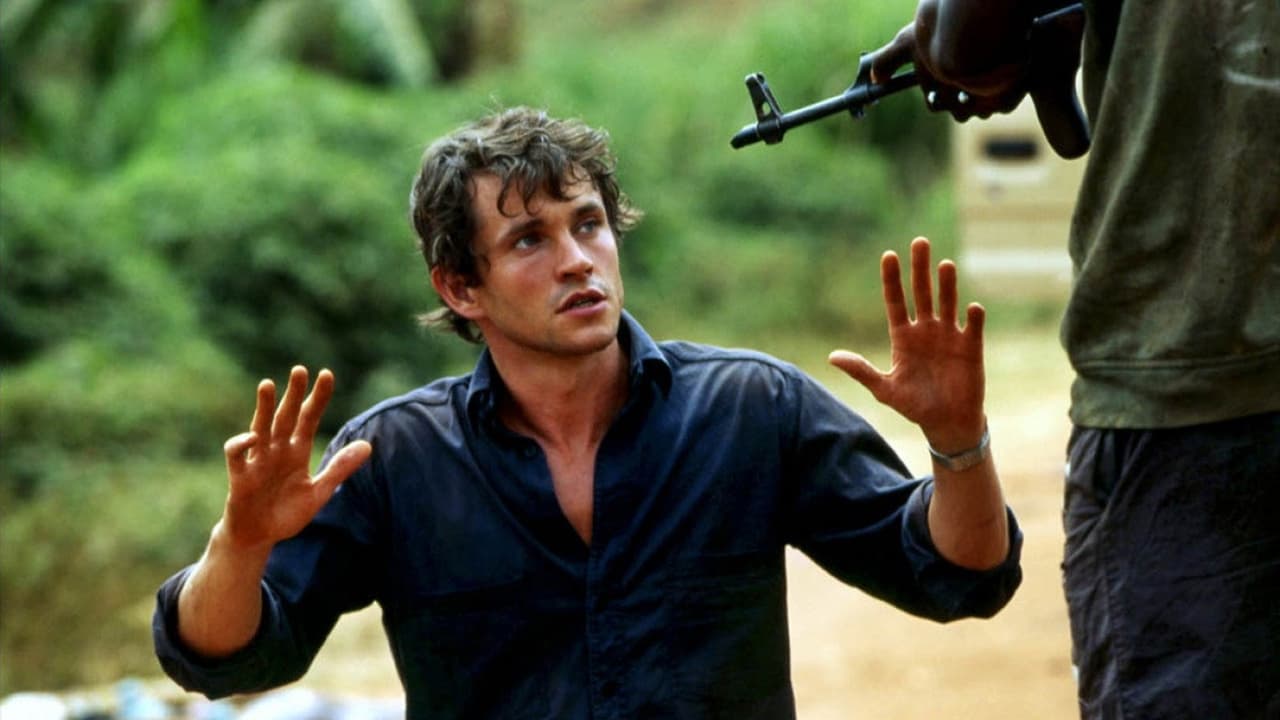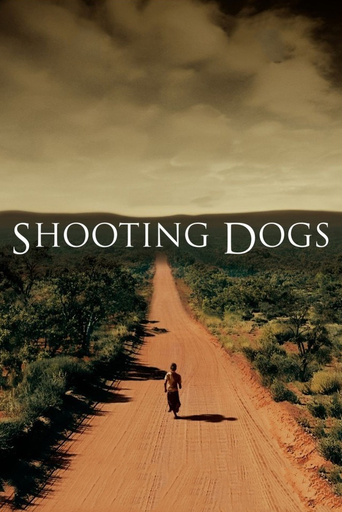Mjeteconer
Just perfect...
Lidia Draper
Great example of an old-fashioned, pure-at-heart escapist event movie that doesn't pretend to be anything that it's not and has boat loads of fun being its own ludicrous self.
Rosie Searle
It's the kind of movie you'll want to see a second time with someone who hasn't seen it yet, to remember what it was like to watch it for the first time.
Delight
Yes, absolutely, there is fun to be had, as well as many, many things to go boom, all amid an atmospheric urban jungle.
Zev
Of the four movies I watched on this topic, I felt this to be the strongest and there's a lot to praise about this one.This one isn't just another 'important' or award-baiting film about the genocide. It is intelligent and full of very difficult questions and strong themes. It does not just try to manipulate its audiences with emotional drama, but provokes the brain as well.The genocide is told from the point of view of the true events at 'Ecole Technique Officielle', where a priest and English teacher find their world and beliefs crumbling, where a UN force with its hands tied behind its back can only frustrate rather than help. We also get to know several Rwandans trying to survive.Besides the fact that it is all very well done and we get John Hurt in another amazing performance that required every millimeter of range and power that the actor has to offer, it also asks questions: How do you behave when you are helpless in the face of savagery? How far can you stick with an ideal? How much effect are Christian missionaries really having on Africans when you see this kind of behaviour? How can humans be both mercilessly savage as well as noble? In one brutally honest scene, a reporter regrettably admits to not being disturbed as much because, whereas in Bosnia it could have been her mother, this is 'just a bunch of Africans killing each other'.It doesn't have a bleeding-heart slant and it wouldn't have had such an effect on me if it had. It doesn't blame the Belgians as the trend dictates, a trend that ignores the longer history that separated the two peoples which the 19th century missionaries as well as 20th century Belgians probably made worse. But it does justifiably lash out at the UN that is worse than useless.It does have one flaw though, in that it almost never gives us any background and simply portrays Tutsis as a minority that is being methodically hated and killed by the Hutus. It never goes into the why's and origins of all the hate, nor does it talk about the fact that Tutsis were in power and controlled the Hutus and waged war with them previously several times, not to mention their killings of 100,000+ Hutus in Burundi.Comparisons: 'Sometimes in April' (with Idris Elba) is more informative and gives you a survival story from the point of view of Rwandans. As such it is very good, but I didn't find it as compelling or powerful.'Shake Hands With the Devil' tells it from the point of view of the UN, but, disappointingly, focuses only on middle-management, telling the tale of General Dallaire who tried to do what he can, but found his goals always undermined and his hands tied at every turn. The decision makers and their point of view remained a mystery, and their behaviour seems consistent with malicious intent. This weakened the movie, but it remains a good one-time watch.By contrast, 'Hotel Rwanda' got most of the attention, yet it is the weakest of the four, despite its interesting protagonist. It sanitized the genocide a bit, and felt a bit Hollywoodized in comparison.
freemantle_uk
In recent years us film fans got two films on the Rwandan genocide, Hotel Rwanda and Shooting Dogs. Hotel Rwanda focused on Paul Rusesabagina, a Hutu who saved Tutsis and became known as the African Schlinder. Shooting Dogs focuses on a similar theme, where a Catholic Priest Christoper (John Hurt) and teacher Joe (Hugh Dancy), try to protect Tutsi people in their school behind a shield of Beligan UN troops.The film starts with a quick history of the situation where UN troops were sent to monitor a fragile peace in Rwanda and see the Beligan troops based at Christoper's school Ecole Technique Officielle. Christopher had been in Rwanda for thirty years, whilst Joe is new to the country, but starting to get to know and like the people. In Rwanda the situation is tense and they are signs of tension, such as roadblocks which soldiers stop and beat up Tutsis, and Hutu militia attacking Tutsi peace protesters. They was also propaganda against Tutsis on the radio and tones of racism, where Hutus call Tutsis cockroaches. These tensions explosive when the President of Rwanda is killed in a plane crash, it's unknown if it was an assassination or a accident. Hutu extremest uses this as a change to overthrow the government and start their racial policy of wiping out the Tutsi. Christoper and Joe are thrown into the middle of this and they allow Tutsis into the school and make it into a refugee camp. Out in the streets the capital becomes a ghost-town and the Hutu militia rule, killing as many Tutsis as possible. Christoper, Joe and BBC reporter Rachel (Nicola Walker) all see this when trying to get supply and footage. The school leadership plead with the Beligan Captain (Dominique Horwitz) to try and take a more proactive role in stopping the killings. The captain is sympathetic but he has few men and the UN mandates was so strict that it prevented the troops from doing anything except in self-defence. The film shows the UN were useless in the situation. As the genocide continued no where seem to be safe, with schools and churches being attacked and the killing was indiscriminate, including the killing of babies. Because of this the west decide to take as many of their people out as possible and leave the Rwandans to their fate.This is a powerful film, showing how savage the conflict and the genocide was. It was brutal and unlike Hotel Rwanda, you see the violence in this film. It shows broken friendships, conflict with the school and man-kind at its best and worst. At times it a touch watch and it needed a strong filmmaker and a non-Hollywood style. This is Michael Caton-Jones' best film, and these are the types of films he should make. The acting is really strong by all the performers, especially John Hurt as a priest. As well, unlike Hotel Rwanda which was filmed in South Africa, Shooting Dogs was shot on location and a lot of survivors were used during the filming, from extras to Assistant directors to background staff. It adds a favour to the film. The characters were made to see as human as possible, not one dimensional beings. All characters had a charge to shine. The filmmakers took great care trying to show the personal accepts whilst looking at the wider picture. The is a strong script behind the film, written by David Wolstencroft, creator of Spooks and main writer during the first 3 seasons (when the show was at it best), and a very promising British talent, and Richard Alwyn, a BBC producer who was in Rwanda at the time of the genocide and knows the story what happened at the school from first hand experience. As well the film was critical of the UN and the west for not doing anything in Rwanda.Shooting Dogs has been criticised for trying to tell the story of the genocide from a white man's presceptive. I can understand the criticisms but sadly I think its hard to market a film like this without western money and support, nor been seen without western faces. Some of that is true to Hotel Rwanda as well. However, I think that they could have a more prominent role for a Rwandan character. The only major Rwandan character was a girl called Marie (Clare-Hope Ashitey), a pupil at the story. However even her character wasn't that major and she could have had a little more to do. I also feel that the final scene could have been done differently.All in all a very strong film and is worth watching.
TxMike
An alternate title for this movie is "Shooting Dogs", which we begin to understand as the movie goes forward. As bodies of the dead began to mount up, dogs had to be shot to keep them from eating them.This movie covers the same time period in 1994 as the excellent "Hotel Rwanda." During when most of the killing was done, about 800,000 had been killed. This movie covers events where perhaps 2,500 of those were killed.John Hurt is Father Christopher, Catholic priest in a Rwandan technical school for the kids. There is a fence and iron gates around it. When the president is killed by the insurgents, townspeople who fear for their lives head for the school, which already had UN "peace-keeping" troops inside. By order of Christopher, the people were let in.Hugh Dancy is young man Joe Connor who teaches at the school.The story centers upon the survival of these people inside the school grounds, while we see hundreds outside being killed if they did not belong to the correct race. It is a very difficult movie to see, but worth a viewing as a way to stay aware of what can happen around the world.SPOILERS: The UN troops had orders not to shoot unless they were fired upon first. So, even though they witnesses senseless killings, they could do nothing. Eventually military trucks came to take away all the whites, but the native Rwandans were left behind, to be slaughtered. Only very few survived, and some of those participated in making this movie.
jmoore964-1
Both Hotel Rwanda and this film stuck with me in terms of the sounds. In Hotel Rwanda it was the metallic grate as they dragged their pangas (machetes) along the road. In this film it was the whistles blowing. Both sounds signaled that death was approaching. It must have been utterly terrifying for the victims to hear those sounds and know that they were about to be killed.The scene where the man asks the UN soldier to kill them rather than leave them to be tortured was the most difficult for me. When the soldier refused, the man then begs him to at least kill the children, to save them from suffering. One can only imagine how that soldier felt. He had to say no, but knew what he was leaving all those people to face when the terrorist swept in.This film, Hotel Rwanda and Sometime in April all complement each other in telling the horrors that the rest of the world ignored.

